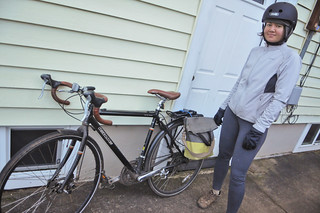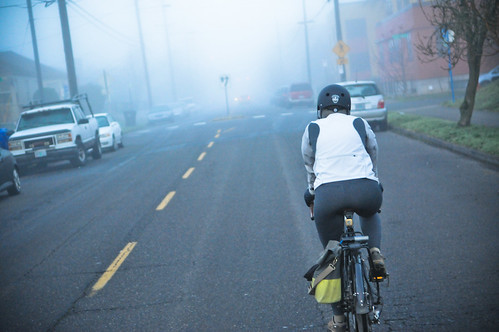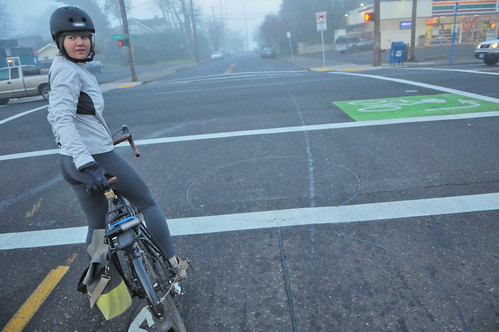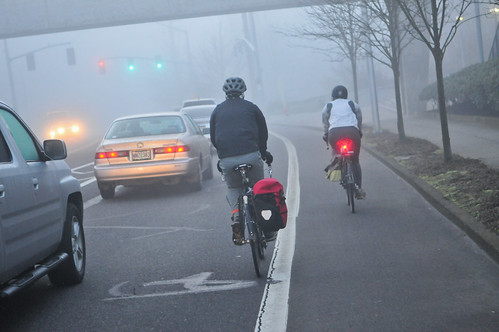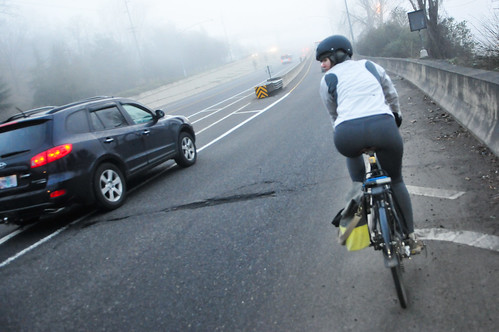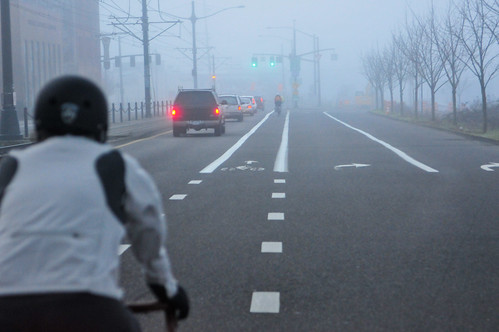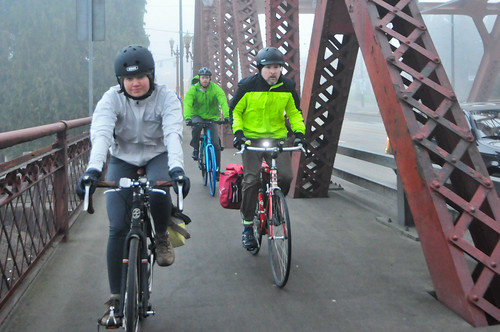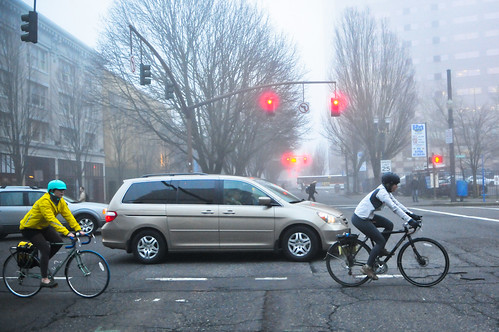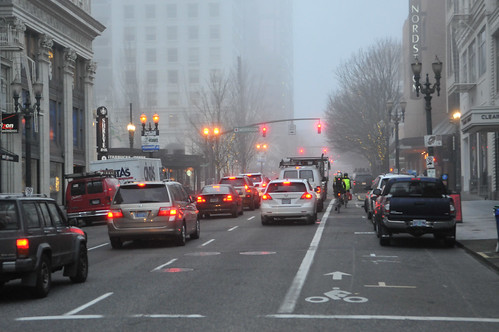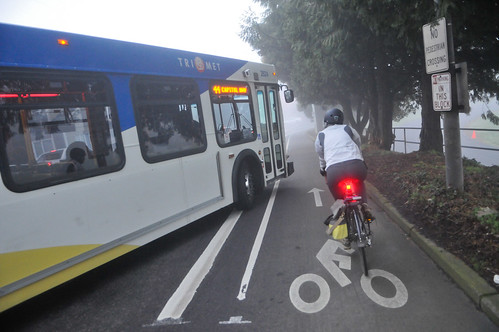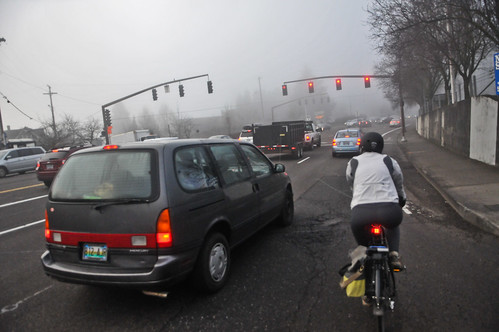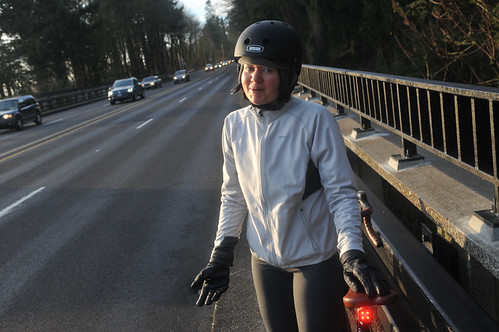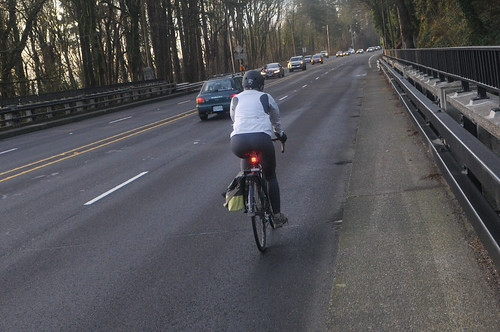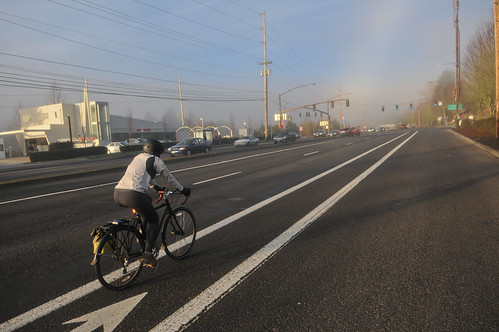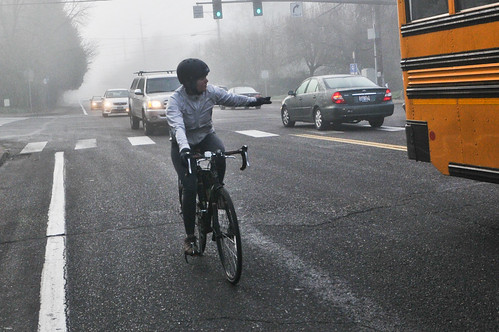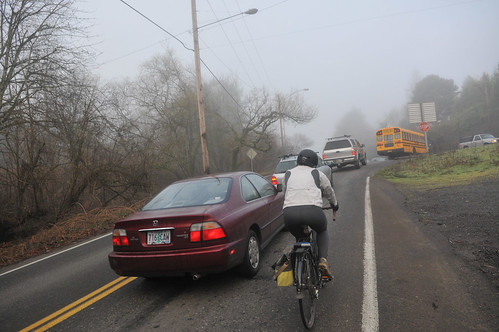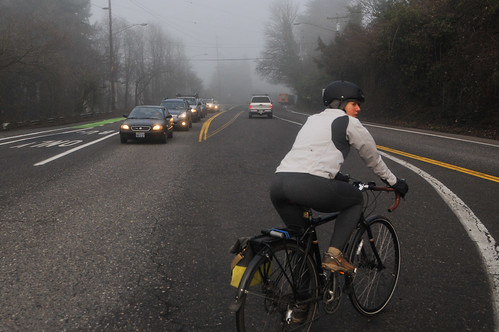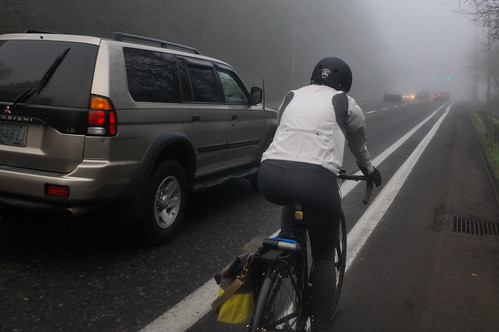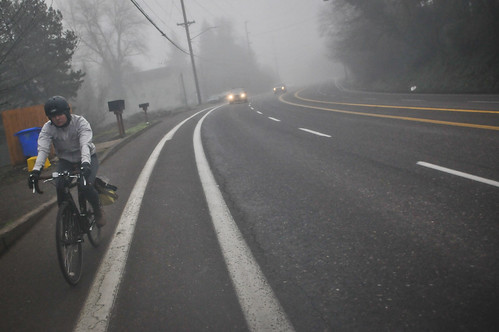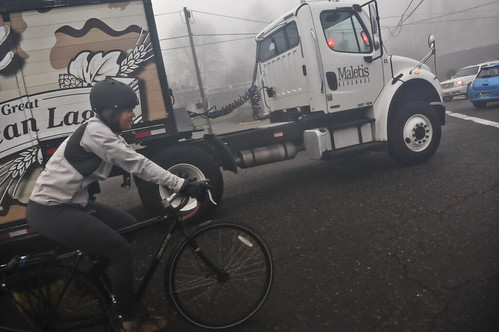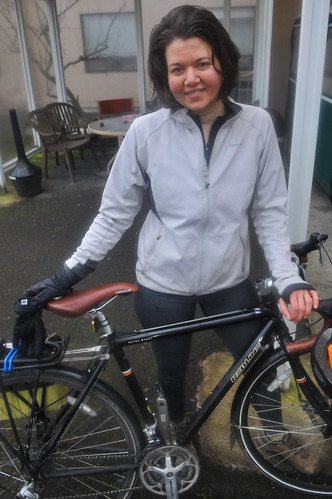
(Photos by J. Maus/BikePortland)
This post is part of our SW Portland Week.
Alexandra Reis (she goes by “Ali”), a 30 year-old social worker who lives in north Portland’s Overlook neighborhood, is one tough cookie. She earned her urban cycling stripes on the streets of Brooklyn and Manhattan while going to graduate school at New York University. Now she’s putting her street smarts to use on her 11-mile daily commute to the outer limits of southwest Portland.
I met up with Reis at her home just after sunrise yesterday morning and learned she’s been doing this commute for the past three years. She’s not new to bicycling, but the thought of riding 22 miles every day just to get to work was daunting at first. “I thought it’d be too far to ride,” she said. Then she had a work training down on SE Holgate and realized, “Hey, that wasn’t so bad, I could do it.” So she did.
“The first time I did the ride it was bad,” she recalled. “I took Terwilliger [instead of Barbur] and it was hilly and I kept getting lost. At first I’d do the ride just 1-2 times a week, then my endurance built up and now, well, it’s the best part of my life.”
Reis and her husband own a car, but they rarely use it. She cherishes her time on the bike each day. As a social worker at a nursing home, she understands the importance of staying in shape — both physically and mentally. “I think everyone should exercise daily, for mental health if not anything else. My ride is an important transition between work and life and it’s time without a device. I use it for thought processing.”
As Reis readied her hefty Redline drop-bar commuter bike, she explained the route we’d take: through downtown on Broadway, then onto Barbur, Bertha, then Beaverton-Hillsdale Highway. “Flat as possible is my goal,” she pronounced.
We rolled through foggy neighborhood streets and then down N Greeley Ave. That’s a street many people are afraid to ride, especially the part at the southern end where riders must cross over a freeway on-ramp at high speeds. But Reis, in addition to preferring a flat route, is all about speed and directness. That’s why she opts for Greeley over Interstate Ave (which is slower and has “too many stops” she says).
Advertisement
Reis’s riding style is fearless, yet kind. She didn’t flinch at all in high-trafficked spots (not even when a TriMet bus operator pinched her in the bike lane – more on that below), and she always used hand signals and waves whenever needed.
From Greeley we rolled onto the Broadway Bridge, which was full of bike riders. I usually ride downtown an hour later than Reis, so I hadn’t seen this much bike traffic since last summer.
Once onto Broadway, we tried to keep up a conversation, but the hectic environment and narrow bike lane prevented it.
As we made our way over I-405, I was curious how Reis would make the connection to SW Barbur. The bikeway leads you to go right on Terwilliger then left on Sheridan. But Reis would have none of that. As we went left from the I-405 overpass, she just took the lane and made the right onto 5th, then to Barbur. As we turned off 5th at Sheridan (just before Barbur), a TriMet bus operator swung half-way into the bike lane. Reis barely flinched. She just held her line and kept riding. She even did a polite little wave to the operator as she passed by, as if to let him know, “It’s cool, I’m OK.”
Once on Barbur, Reis said, “All right, now we’re on Barbur, this is my favorite part because there are no more stops.” When I mentioned to her that riding on Barbur makes some people nervous, Reis admitted that, “I think I actually like riding in places other people don’t.”
She’s desensitized. “I’m in that New York mindset where everyone honks at you,” she said.
It’s also worth noting that Reis is hearing-impaired and she’s worn hearing aids since the age of two. A genetic condition has given her moderate to severe hearing loss in both ears (mostly the right one). Because of that she can’t rely on hearing oncoming cars or other riders. “I always have to look,” she said, “which I guess you should do anyway.”
The hearing impairment also means Reis can’t hear when people yell at her. “So I always assume they’re saying nice things,” she says with a smile.
As we pedaled on Barbur I asked why should doesn’t take Terwilliger, a nearby street that runs parallel and is much quieter. Reis prefers Barbur, she said, for the views and for the flatter topography. When we got to the Vermont bridge, she wanted to stop and show me the view. She also said there’s a fig tree nearby she’s actually stopped and eaten figs off of. “I’m always looking for fruit trees,” she said.
I asked what she thought of the “improved” sidewalks on the bridges (ODOT has just completed a seismic rehab project on the Vermont and Newbury bridges) and she wasn’t impressed. Would you ever ride on them I asked. “Hell no!” was her reply. “They’re too narrow to feel safe on and, look, it’s barely wide enough for two panniers. It feels less safe than the street.”
Reis’s idea for the bridges is to turn the sidewalk into a bike path. “No one ever walks out here anyways,” she said, “And besides, there’s no sidewalk leading up to this.”
After our chat on the bridge as the sun came up over the Willamette, she actually got off the bridge sidewalk, put her bike back in the street and continued on.
Now before you think Reis isn’t afraid of anything, she did let on that this section of Barbur is “a little nerve-wracking.” “I wouldn’t send my little sister on this,” she said, “And she’s 26.”
As we came to the Capitol Highway turnoff, I suspected we’d hang a right and take that directly through Hillsdale and then onto Beaverton-Hillsdale Highway. But Reis kept straight. Turns out she prefers the Barbur to SW Bertha connection instead. It’s 1.5 miles longer, but she said she gets “too sweaty” going up Capitol Highway (not to mention it’s a pretty narrow uphill bike lane compared the the more gradual and wider bike lane on Bertha).
As we rode onto Bertha and made our way to the tricky intersection of Bertha/Capitol Hwy/Beaverton-Hillsdale Hwy, Reis once again just rolled right out into the intersection. Calm and cool onto the buffered bike lanes of BHH. Do the new buffer stripes make her feel safer? “Yes. They It’s amazing what a little line can do.”
From there it was an easy downhill shot all the way to her work at SW 65th.
Fortunately for Reis, she commutes in the opposite direction of most people, so the traffic stress isn’t nearly as bad. On her way home she takes a different route: Capitol Hwy to Barbur, then Naito and Waterfront Park. She’s not a fan of the path on the Waterfront because of all the crowds, but she does it because, in her words, “There’s no other way to get through downtown!”
Thanks for lettings us tag along Ali!
Hope you’ve enjoyed this look at a southwest Portland commute through the eyes of an everyday rider. If you’re curious, you can check out her route here.
— Read more Ride Alongs here. I’d really love to find a sponsor for this column, get in touch if you’re interested!
We’ll be here in Southwest all week! And join us tonight (2/13) for a BikePortland Get Together and social hour at the Lucky Labrador Public House in Multnomah Village (7675 SW Capitol Hwy) from 4:00 – 6:30pm.


